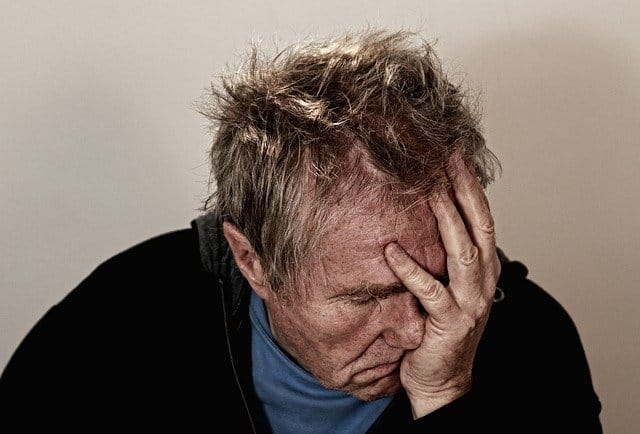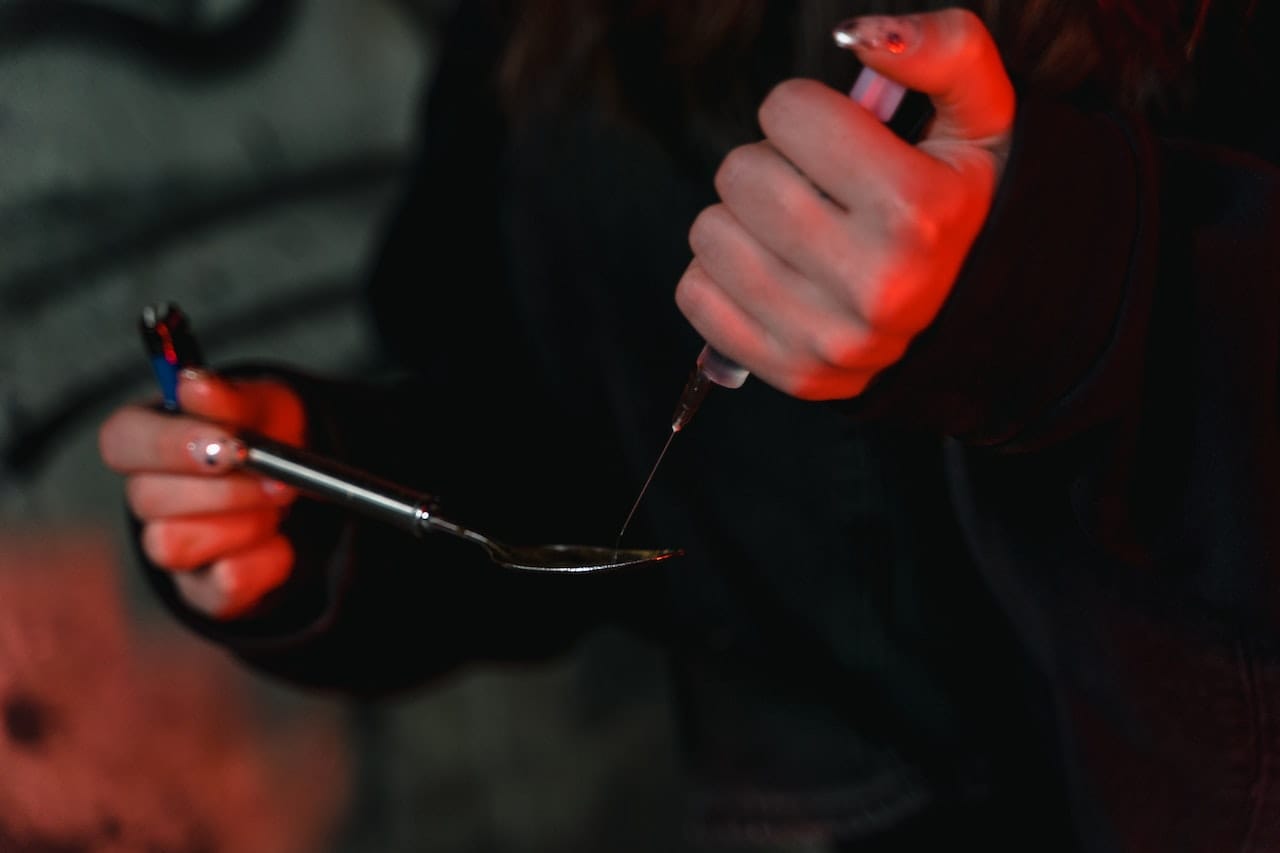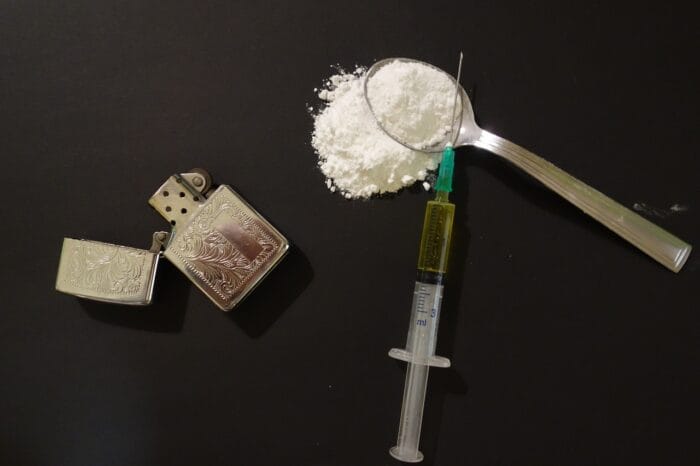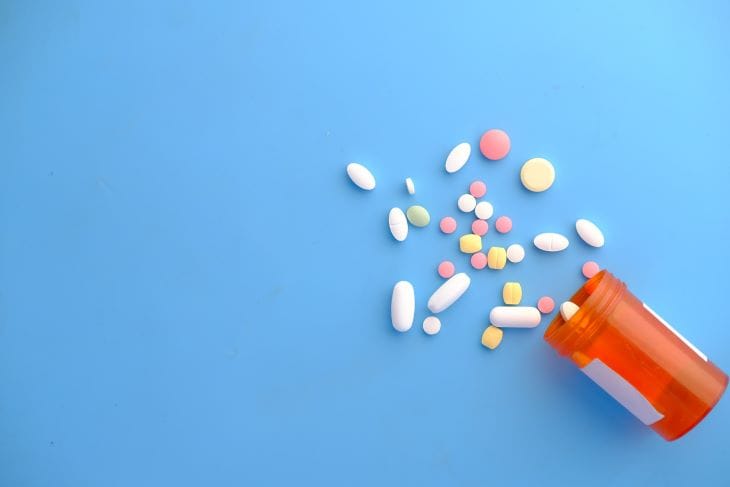Substance addiction – in whatever form – has the potential to be dangerous and cause serious long-term harm, or even complications which lead to death.
Regardless of whether you’re suffering from nicotine, alcohol or heroin addiction, all substance addictions have their own unique dangers.

Asking “which is more dangerous, alcoholism or heroin addiction?” is reductive.
This is because one addiction is not inherently “worse” than another, as they each have their own unique symptoms and long-term dangers. The truth is that it always depends on the individual case.
Both alcohol and heroin are psychoactive substances.
While heroin is thought to be a more extreme form of substance abuse, alcohol is far more accessible and therefore alcohol dependence is arguably a more prevalent problem.
However, heroin can be ingested by injecting using needles, snorting or smoking.
These can each cause their own unique problems which are different to drinking alcohol.

Furthermore, the normalisation of alcohol consumption and the stigmatisation of heroin consumption (especially through injection) means that society faces a range of different problems with both.
While heroin may be stigmatised more so than alcohol, that doesn’t mean that an alcohol addiction is not as dangerous as a heroin addiction.
There are many variables to consider when assessing the severity of a substance addiction.
It depends on the quantities of alcohol or heroin that someone consumes, the quality or strength of the substance, whether they have any pre-existing physical and mental health conditions, social and environmental factors, and much more.
One person will be able to consume higher amounts of alcohol, for example, than another person, before experiencing addiction symptoms.
This is especially true if someone is already suffering from any physical or mental issues.
Someone who is suffering from existing liver or kidney issues, or a mental health issue such as anxiety or depression, will experience greater symptoms than someone who does not already suffer from any illness.

Alcohol addiction is one of the most common forms of substance addiction.
This is because of how alcohol is perceived in our culture.
It is legal, and therefore very accessible.
It’s also heavily normalised and even encouraged, as it is what many people turn to whether they are celebrating, socialising and even grieving.
In fact, alcohol addiction is the second largest group for adults undergoing rehabilitation and treatment at rehabs in the United Kingdom.
According to the Adult Substance Misuse Treatment Statistics 2022 to 2023, a report from the UK government, 30% of people undergoing addiction treatment are specifically recovering from alcohol addiction. [1]
While this statistic is significant, there remain to be many more people who are undiagnosed for their alcohol addiction.
Studies estimate that 10 million people in England alone exceed the drinking guideline for alcohol, [2] of which 1.7 million drink at high-risk levels, and around 600,000 people are dependent on alcohol.
However, it is possible that the number is far higher, as many people remain undiagnosed for their excessive drinking habits.

Alcohol is both physically and psychologically addictive.
This means that those who are drinking alcohol frequently and excessively are at risk of developing an addiction which will present a range of physical and psychological symptoms.
The most common psychological symptoms of alcohol addiction include:
The most common physical symptoms of alcohol addiction include:
While alcohol can make us feel relaxed, happy and sleepy, these effects are short-lived and it poses many adverse effects both in the short term and long term.
Since alcohol is a depressant, it affects our brains and central nervous system.
It does this by slowing down messages between neurons in our brain, reducing concentration, coordination and our own stress responses.

Additionally, it stimulates our dopamine production – the “feel good hormone” – which makes us feel happy when we are intoxicated with alcohol.
However, once we abstain from alcohol for a period of time, we go into the withdrawal stage.
Here, we will experience intense withdrawal symptoms and we will be put into a negative emotional state and significant physical discomfort.
The amygdala – which helps us regulate emotions – becomes hyperactive as a result of this alcohol withdrawal.
Stress-related neurotransmitters [3] are activated in our brains during this stage, and we begin to experience symptoms such as irritability, paranoia, anxiety, depression, and more.
This is often casually referred to as “hangxiety”.

The effects of alcohol addiction are not confined to the anxiety and depression-inducing hangovers or the compulsion to consume alcohol.
Once people overcome the short-term hangover symptoms, they quickly forget about how toxic and dangerous long-term and excessive alcohol consumption can be.
Long-term symptoms and effects of alcohol addiction include but are not limited to:

Heroin is a very addictive drug which belongs to the opiate category of substances.
In contrast to alcohol, heroin can be ingested by smoking, snorting or injecting the substance, which can cause other complications not presented by alcohol consumption.
According to studies by the UK Government, [12] out of the 290,000 adults who entered a drug and alcohol rehab from 2022 to 2023, almost half (48%) were due to opiates, mainly heroin.
This makes up for the largest group of patients in a drug and alcohol rehab for treatment.
Patients who were recovering from alcohol addiction made up the second largest group.
While you could argue, based on this statistic, that as many or more people suffer from heroin addiction as alcohol addiction in the UK, the normalisation of alcohol also means that many alcohol-dependent users do not seek treatment, because they underestimate the severity of their addiction.
Injecting heroin into the body results in almost an immediate rush of euphoria.
Users will experience an intense high, with injecting heroin being the quickest way to induce it since heroin is being injected directly into the bloodstream.
Smoking heroin also provides quick, stimulating effects, without the more negative connotations that injecting a drug carries and also fewer dangers of disease transmission, such as HIV.

Smoking heroin can lead to inflammation and scarring of the lungs, and bronchiectasis which can cause intense mucus build up in the lungs.
The effects or “high” of snorting heroin will take a little longer to manifest.
The long-term effects associated with snorting heroin include ruptured blood vessels in the nose, the erosion of nasal tissues, fungal infections and more.
Like alcohol, heroin is a depressant, slowing down brain and central nervous system functions.

Heroin is highly addictive.
Unlike alcohol, where you may need to consume large quantities over a significant period of time in order to develop a dependence, the body can adjust quickly to heroin consumption.
It adjusts by increasing its tolerance against it, and this means that users will need to increase the quantity of their heroin usage, which leaves them even more susceptible to developing a severe addiction.
Additionally, this means that a regular user will find it difficult to abstain, because the body has become accustomed to having heroin in the body, thus becoming dependent.
Even in the short term, users are at risk of overdosing simply because of how quickly their tolerance can build, and how they will need to keep increasing their consumption to match previous highs.
This will lead to dangerous quantities of heroin being consumed.
Common symptoms of heroin addiction include:

The long-term effects and symptoms of heroin addiction are seriously harmful and can lead to death.
They can come in the form of physical appearances such as dry and itchy skin, nasal perforation or collapsing, or internal problems such as tuberculosis (shown in 70% of heroin addiction cases[13]), brain damage and cognitive decline, and more.
Long-term heroin addiction effects and symptoms [14] include but aren’t limited to:

A range of studies indicate that those who are already addicted to alcohol are far more likely to suffer from a heroin addiction than someone who doesn’t drink excessively.
This is because structures in the brain have already been altered in a way which makes them more vulnerable to becoming dependent on addictive substances.
Both alcohol and heroin are depressants, meaning that they affect the central nervous system similarly by temporarily reducing activity in the brain.
This can intensify symptoms of depressant substances such as:
Simultaneous polydrug use – when a user is consuming more than one addictive substance during the same period of time – is dangerous.
This can not only amplify many of the effects but cause many complications and lead to overdosing or even death.
Alcohol is typically the most commonly used substance in cases of polydrug use.
Studies show that a large majority of deaths attributed to heroin overdose also involve high levels of other drugs, especially alcohol. [17]

In order to recover from an alcohol addiction or a heroin addiction, one must do so safely under medical supervision.
Those who are only suffering from mild forms of alcohol addiction can potentially recover independently as long as they are not suffering from any health conditions or intense symptoms which complicate their recovery.
However, they are encouraged to seek professional treatment, this is because it is the best time to develop healthy habits and overcome withdrawal symptoms before they become too severe.
It is important that you don’t ever feel that your addiction is too slight to seek help.
The sooner you seek help, the better.
If someone is suffering from a moderate to severe alcohol addiction or a heroin addiction of any kind, it is imperative that they seek treatment at a drug and alcohol rehab.

You can contact us at Rehab 4 Addiction by calling the number 0800 140 4690.
When you call us, you will be greeted by a friendly and experienced member of our team who will be at your disposal to answer any questions you have about your addiction, the recovery process, your options and so on.

Only once you are comfortable enough to do so, will we begin the pre-admission assessment.
This is a simple assessment or survey where you will answer questions about your medical history, addiction history, current physical and mental health, and so on.
This is done free of charge, and can be done over the phone from the comfort of your own home.
Your information will only be shared with a consultant psychiatrist or addiction consultant who will help optimise your recovery.
This will be done by tailoring the recovery programme to your unique preferences and needs.
Each case of addiction is different, so it is very important to personalise treatment. This will help optimise your recovery.

Once you have entered your chosen drug and alcohol rehab, you will be welcomed by staff members who will help you familiarise yourself with the place.
Shortly after, you will undergo the medicated detox process if required. This typically takes around 7 to 10 days.
During the medicated detox, patients will spend their time in a safe and comfortable environment as they allow the toxic substances to withdraw from their bodies.
This will be done at a medically supported facility under the supervision of healthcare professionals.
Patients will also be prescribed a range of medications which will help prevent and minimise symptoms which can complicate recovery.
For alcohol and heroin addiction, medication such as benzodiazepines, methadone and buprenorphine will be prescribed.
These will reduce symptoms of anxiety and depression, prevent seizures and more.

Once you have safely overcome your alcohol or heroin withdrawal symptoms, you will be ready to proceed and undergo a programme of therapy and counselling.
While the medicated detox is imperative for many patients, therapy and counselling will help patients establish long-term solutions to their substance addiction.
This includes developing new coping mechanisms, forming a positive and healthy lifestyle.
Some of the most important therapeutic approaches throughout addiction recovery include but are not limited to:

The question of whether heroin addiction or alcohol addiction is more dangerous is something of a moot point – both can be deadly.
Regardless of if you’re worried about an alcohol addiction or a heroin addiction, the solution will always be to start your journey to recovery today.
Our expert team is ready to help you find your ideal treatment service.
By dialling us on 0800 140 4690, you will have taken the first step towards living a better life.
Recovery is a long process, but with our expertise and your intrinsic motivation, we can achieve lifelong recovery and abstinence together.
[4] https://www.hazeldenbettyford.org/research-studies/addiction-research/brain-disease-model
[8] https://pubmed.ncbi.nlm.nih.gov/1467026/
[9] https://www.cancer.gov/about-cancer/causes-prevention/risk/alcohol/alcohol-fact-sheet
[10] https://www.cancer.gov/news-events/cancer-currents-blog/2021/cancer-alcohol-global-burden
[13] https://pubmed.ncbi.nlm.nih.gov/16903459/
[14] https://nida.nih.gov/publications/research-reports/heroin/what-are-long-term-effects-heroin-use
[15] https://www.ncbi.nlm.nih.gov/pmc/articles/PMC5152678/
[16] https://ndarc.med.unsw.edu.au/blog/yes-people-can-die-opiate-withdrawal
[17] https://www.ncbi.nlm.nih.gov/pmc/articles/PMC3860457/
[18] https://www.alcoholics-anonymous.org.uk/